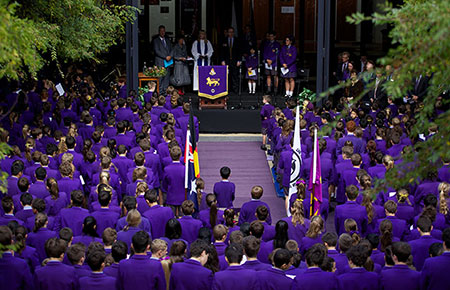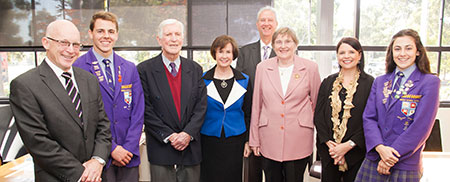Across the College this term, our College theme for 2013, Learning to Be, has resonated strongly in many forums. From assemblies commemorating ANZAC Day and Founders’ Day earlier in the term, to our 20 year celebration of Year 12 at Glen Waverley, and, recently, at other regular assemblies honouring grandparents, family friends, and Aboriginal guests to the College for Reconciliation Week, there have been many opportunities to examine what it means to learn to be.

Anzac Day Service at Glen Waverley

Special guests at the 2013 Founders’ Day Assembly at Glen Waverley. (L-R) Peter Harrison - President of Wesley College Council, Nicholas Ensor - School Captain, David Prest – former Wesley College Principal, Helen Drennen – Principal, Richard Brenker – Head of Glen Waverley Campus, Term 2 2013, Barbara Lynch – former Head of Glen Waverley Campus, Jacinta Janssens - Head of Elsternwick Campus, Cassandra Charlaftis – School Captain
As individuals, and as an institution, we are all in a continuous state of Learning to Be. Our growth within Wesley, and as a College, in many ways mirrors the kind of growth we encourage in individuals, so that both the school and its community, and the individual, attain a deeper sense of who they are.
In the broad context of learning, and especially encompassing learning to know, learning to do, learning to live with, and learning to be, it’s important for us all to have a sense of what success means.
At Wesley, central to all that we do, is our focus on the academic development of every child and his or her achievement. But, important, too, is a broader understanding of success.
The recent report of the Menzies Research Institute highlights that success in life, 20 years on from school, is linked to the lasting impact of a child’s engagement at school across a broad range of educational experiences, over and above their academic attainment. The study emphasises that the more children feel connected to and engaged in their school community, the greater their likelihood of achieving a higher education qualification and ongoing career success.
Recently, I was also impressed by a longitudinal study of Australian youth, by Sinan Gemici, Patrick Lim and Tom Karmel, endeavouring to define the factors determining Year 12 academic success as measured by the ATAR score, the Australian Tertiary Admissions Rank, on a 100 point scale. For the first time, an Australian study has attempted to quantify the contribution that a school’s culture and environment make to this high profile measure of academic achievement. This study found that as many as 20 ATAR points of the student’s final score can be attributed to the culture and ethos of the learning environment of the school.
Much attention is being given, worldwide, to school improvement and in Australia the National School Improvement Tool, published by the Australian Council for Educational Research (ACER) last year, brings together findings from international research into the practices of highly effective schools.
At Wesley, teachers have responded positively to this ACER report and, particularly, to the importance of analysing and using student data to inform day-to-day practice in the classroom.
Annual Reports 2012
Earlier this term we were proud to see published both the Wesley College Annual Report 2012, and the Yiramalay/Wesley Studio School Annual Report 2012, which give an overview of all that was achieved last year.
Both annual reports are available on the College website and hard copies are available on request from campus reception desks.
Strategic Plan 2004 – 2016
Last year saw the completion of the third triennial review of our College Strategic Plan and at the half-way point of the 2013, a significant number of actions have been completed for this year. A copy of the plan and action summary for Terms 1 and 2, 2013 is available on the College Portal covering all five areas of the plan including:
Learning
Teaching
Community
Programs/Structures/Settings
Corporate Governance and Business Management
This year sees the preparation for the structure of the next plan 2017 – 2030 and we look forward to sharing progress later in the year.
Helen Drennen
